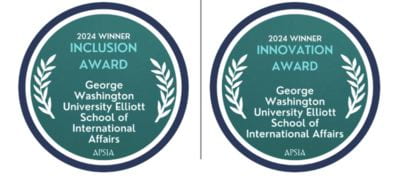as seen in the September/October 2024 issue of Foreign Affairs
Author: Maryam Z. Deloffre, Associate Professor of International Affairs and Director of the Humanitarian Action Initiative at The Elliott School of International Affairs
How do the Elliott School’s programs prepare students to address humanitarian crises and provide effective assistance in complex global contexts?
At the Elliott School, courses on humanitarian action take a multidisciplinary and intellectually rigorous approach, paying particular attention to cultural context, ethics, field-based applied research, and innovative practices. A foundational course in humanitarian governance and policy introduces students to the global humanitarian system, key humanitarian agencies and donors, international humanitarian law and ethics, dilemmas in humanitarian assistance, and key challenges to delivering humanitarian aid. Specialized courses help students develop expertise in locally led humanitarian assistance; climate change and humanitarian assistance; refugees, migration, and displaced people; gender and security; humanitarian communication; education in humanitarian emergencies; ethics; and emergency management.
Students may pursue a concentration in humanitarian assistance in a number of our degree programs. It is a specific area of concentration or specialization, available under the following Elliott School master’s degree programs, including the security policy studies program conflict resolution concentration, the Master of International Affairs, and the Master of International Development Studies.
Are there fieldwork and research opportunities available to students looking to gain practical skills in humanitarian operations?
Most graduate courses provide project-based learning where students work on policy problems in consultation with humanitarian nongovernmental organizations or agencies. The humanitarian assistance section of the global capstone, as well as the capstone in international development studies, provide an in-depth and extensive opportunity for student teams to work on a year-long project for a humanitarian client. Undergraduate students may work on independent research projects on the topic of humanitarian assistance in Dean’s Scholars and other undergraduate research opportunities. Students can also reach out about available research assistantships to work on research projects directed by a faculty member.
How does the Elliott School approach teaching the ethical considerations and challenges involved in delivering humanitarian aid to vulnerable populations around the world?
The Elliott School approaches teaching ethical considerations and humanitarian challenges through initiatives like the Humanitarian Action Initiative, an academic and research hub that convenes and cultivates the school’s curriculum, scholarly research, and policy expertise on topics related to humanitarian assistance, and the Leadership, Ethics, and Practice Initiative, which integrates the exploration and analysis of ethics topics throughout undergraduate and graduate education.
The school aims to identify ethical issues in every subject and course, exploring them through case studies or other instructional means, through courses such as humanitarian governance and policy, global justice, and accountability and ethics in humanitarian and disaster settings that address questions and issues related to the ethics of humanitarian action. The school regularly hosts speakers on ethics topics and assists students interested in doing research on humanitarian issues.
























